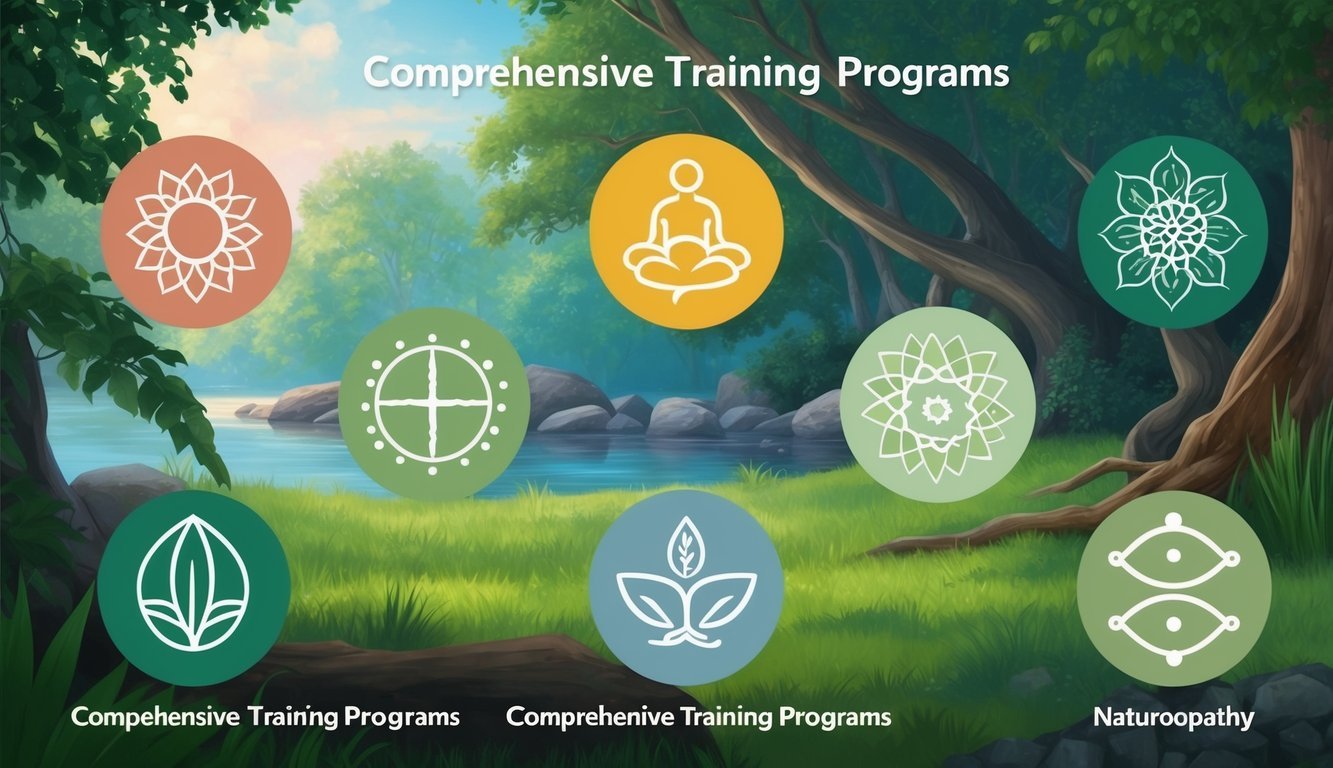If you’re looking to dive into the world of natural health, naturopathy training programs could be the perfect fit for you.
These programs focus on holistic approaches that enhance the body’s ability to heal itself.
Think herbs, nutrition, and various natural remedies—all aimed at helping folks achieve better health.

The best naturopathy programs offer well-rounded curricula that mesh traditional wisdom with today’s scientific research. You’ll gain hands-on experience and learn how to manage your practice, all while making a meaningful impact on people’s health.
Whether you’re looking to switch careers or simply deepen your understanding of natural healing, a solid naturopathy program can really set you on the right path.
1) National University of Natural Medicine
Thinking about becoming a naturopathic doctor? The Doctor of Naturopathic Medicine program at NUNM in Portland, Oregon, could be your ticket! It’s a four-year program that’ll equip you with all the skills you need to thrive in natural medicine.
NUNM has been around for ages; it’s the oldest naturopathic school in North America! With a whopping 4,400 hours of instruction (yes, really—1,200 hours of that is hands-on clinical work), you’ll be ready to hit the ground running when you graduate.
Got a passion for women’s health? NUNM also offers a Natural Childbirth/Midwifery Certificate, which gives you extra training to support women through various life stages.
They don’t just drill facts into your head here—they help you think critically and customize treatments for each patient.
Pretty neat, right?
2) Bastyr University School of Naturopathic Medicine
Want a top-notch program? Check out Bastyr University’s Doctor of Naturopathic Medicine.
They’re known for their outstanding training in natural health.
At Bastyr, they take a systems-based approach—kind of like putting pieces of a puzzle together to see the bigger picture! You’ll gain critical thinking skills essential for treating patients.
The curriculum covers everything from botanical medicine to clinical sciences, giving you a rock-solid grounding in natural therapies.
Don’t forget the hands-on experience! You’ll treat real patients in their clinics, which is super valuable as you prepare for your career.
If you’re curious about other aspects of natural medicine, Bastyr offers programs in herbal sciences and holistic landscape design, which can nicely complement your naturopathic studies.
3) Southwest College of Naturopathic Medicine
Did you know that Southwest College of Naturopathic Medicine is now called Sonoran University of Health Sciences? Exciting, right?
This school is a major player in the natural medicine world, offering a Doctor of Naturopathic Medicine program that dives into holistic healing.
Sonoran offers both traditional and cutting-edge treatments, plus access to a top-notch research institute where you can get hands-on experience.
And here’s the kicker—you can help underserved communities, putting your skills to real use and making a difference!
The curriculum is challenging, but don’t worry; the professors are right there to guide you every step of the way.
4) Canadian College of Naturopathic Medicine

Looking for high-quality naturopathy training? Then take a look at the Canadian College of Naturopathic Medicine (CCNM), with campuses in Toronto and British Columbia.
CCNM offers a rigorous four-year Doctor of Naturopathy program, which combines over 3,000 hours of classroom study with 1,200 hours of hands-on clinical training!
If you’re serious about becoming an expert, they also provide 100 hours of professional development and preceptor experiences to refine your skills.
That’s a lot of learning!
Now here’s something neat: CCNM is the largest naturopathic education provider in North America.
More than 20% of practicing naturopathic doctors in North America graduated from CCNM—talk about impressive!
Founded in 1978, they pride themselves on providing education that expertly blends modern science with natural healing.
Plus, they offer some of the best Traditional Chinese Medicine programs out there, making it a comprehensive option for holistic health.
5) University of Bridgeport College of Naturopathic Medicine

Want to study naturopathy near New York City? Check out the University of Bridgeport College of Naturopathic Medicine.
It’s right on Long Island Sound, giving you a taste of the vibrant NYC culture.
UBCNM is part of a unique Health Sciences Division, which means you’ll get to learn alongside students from other health fields.
Working together like that makes for a richer learning experience!
The college has really grown since its first class graduated in 2001—there are more faculty and students now than ever.
You’ll join a thriving community of future naturopathic doctors.
The program is geared toward training doctors for the future.
You’ll blend research and new technologies with natural healing—providing top-notch care to your patients.
At UBCNM, it’s all about putting the patient first.
They focus on teaching you patient-centered care, which is super important in today’s healthcare landscape.
6) National College of Natural Medicine

You’ll find high-quality naturopathic training at the National College of Natural Medicine (NUNM).
Their Doctor of Naturopathic Medicine program is something to consider.
It’s a four-year journey, covering everything you need to know about natural healing and becoming a skilled doctor.
NUNM’s curriculum offers a comprehensive study plan.
From basic medical sciences like anatomy and physiology to herbal medicine and nutrition, they cover it all!
The hands-on training is invaluable, allowing you to work in their clinics with real patients—perfect for building your skillset.
They even offer a flexible first-year curriculum.
Whether you choose to study online or on campus, it’s designed to fit your lifestyle.
NUNM prides itself on providing high-quality education, and they’ve been shaping the future of naturopathic medicine for a long time.
You’re definitely in capable hands here.
History of Naturopathy

Naturopathy has a rich history rooted in ancient healing traditions.
It evolved to become the holistic approach we recognize today.
Curious about how it all began and who shaped it? Let’s take a stroll through time.
Origins and Evolution
Naturopathy dates back about 150 years.
But its core concepts are way older, pulling from both Western and Eastern healing practices that trace all the way back to Hippocrates.
In the 18th and 19th centuries, modern naturopathy started to take shape, fueled by people seeking gentler, more natural ways to treat ailments.
In 1901, Benedict Lust brought naturopathy to the U.S. He’s often called the father of American naturopathy—a title he undoubtedly earned.
The field gained momentum, but like any good story, it had its ups and downs.
Influential Figures
Many key figures helped shape naturopathy into what it is today, with Benedict Lust being a major player in the game.
He kicked off the first school of naturopathy in the U.S.!
Other notable names include Sebastian Kneipp and Vincent Priessnitz, who introduced water-based healing techniques that are still in use today.
John Henry Tilden made waves with his focus on diet and detoxification, while Henry Lindlahr penned influential texts that spread the naturopathic message.
In more recent years, advocates like Joseph Pizzorno have pushed for scientific research in the field, helping naturopathy earn more respect in the broader medical community.
Curriculum Highlights

Naturopathy programs offer a blend of traditional medical courses and natural healing techniques.
Picture studying both scientific and holistic approaches as you prepare for a career in healthcare.
Core Subjects
You’ll start with biomedical sciences like anatomy, physiology, and pathology—these subjects lay the groundwork for understanding human health.
Natural therapies dive in next.
You’ll learn about herbs, nutrition, and homeopathy, how to harness nature’s remedies to support healing.
And let’s not forget psychology and counseling classes—these are crucial for understanding the mind-body link and providing emotional support to your patients.
Hands-On Training
Your education isn’t just lectures and textbooks.
You’ll get plenty of opportunities to practice with real patients.
Clinical training is a huge part of these programs.
You’ll work in school clinics—or even community health centers—so you can put theory into action.
Lab work is important, too.
You’ll learn how to conduct diagnostic tests and interpret results, which helps you diagnose and treat conditions effectively.
Wanna specialize? Some schools offer specialty clinics, allowing you to dive deeper into areas like women’s health or pediatrics—perfect for zeroing in on your passions!
Frequently Asked Questions

Got questions about naturopathy training programs? You’re not alone! Let’s tackle some of the most common concerns regarding accreditation, online options, and how to pick the right school.
Which institutions offer the best accredited naturopathic programs?
Some of the top schools for naturopathy include the National University of Natural Medicine, Bastyr University, and Southwest College of Naturopathic Medicine.
These places are well-known for their strong programs and experienced faculty.
If you’re in Canada, definitely check out the Canadian College of Naturopathic Medicine.
In the U.S., the University of Bridgeport College of Naturopathic Medicine also offers a solid program.
What options are available for online naturopathy education?
You can find distance learning programs for naturopathy that let you study from the comfort of your own home.
Some schools even offer hybrid programs, combining online coursework with in-person training—great for a balanced approach!
How can I find top-rated naturopathy schools near my location?
Start by checking the American Association of Naturopathic Physicians website.
They list accredited schools all around.
You can also do a quick search for “naturopathy schools” along with your city or state to see what’s nearby.
Look for schools with solid reviews and proper accreditation.
That way, you know you’re picking a place worth your time and money.
Are there any free naturopathic training programs that are comprehensive?
Finding free, comprehensive naturopathy programs is tough.
Most solid programs charge a tuition fee.
However, you might stumble upon free introductory courses or workshops to dip your toes in.
Many schools also offer scholarships or financial assistance, so don’t forget to ask them about that if cost is a concern!
Can you become a licensed naturopathic doctor through online courses?
Typically, you need in-person training to become a licensed naturopathic doctor.
Most states with naturopathic licensing require you to graduate from an accredited, hands-on program.
You can kick things off with online courses, but you’ll likely have to finish your training on campus to gain that all-important practical experience.

